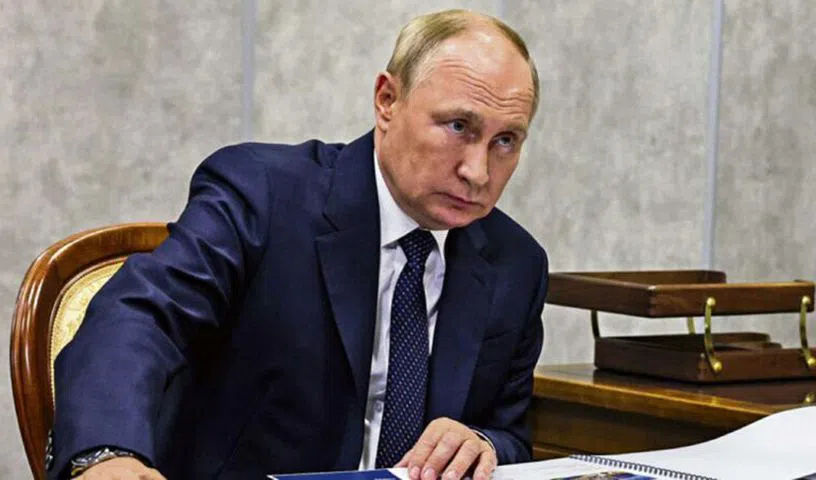Putin arrest warrant is ‘first shot’ in potentially substantial indictment against him

An arrest warrant issued against Russian President Vladimir Putin is the International Criminal Court’s (ICC) “first shot” in what could be a substantial indictment against him, Ukraine’s leading lawyer has said.
The intergovernmental group – based at The Hague – has accused Mr Putin of being responsible for the abduction of children from Ukraine.
An arrest warrant was also issued for Maria Alekseyevna Lvova-Belova, Russia‘s commissioner for children, on similar allegations of war crimes.
Speaking to Sky News, the lead lawyer for the government of Ukraine, Ben Emmerson, said he believes there are two reasons why the arrest warrant against Mr Putin has been issued now.
He said the immediate timing seems to have been the decision by the Office of the High Commissioner for Human Rights at the United Nations in Geneva “to publish a report detailing what the judges believe to be Russian war crimes committed in Ukraine – including the allegations of the forced transfer of children from Ukraine into Russia as a war crime”.
Mr Emmerson said the other dimension to the timing of the arrest warrant is “sometimes when indictments are issued, they are sealed”.
“In other words, they’re not made public. But increasingly, we have seen indictments being issued against leaders during an ongoing conflict that happened in relation to the indictment against General Gaddafi, for example, during the Libyan uprising.”
He said that it has to be recognised that issuing an indictment against a sitting head of state in the midst of an armed conflict is to “some extent affecting the conduct or aimed to affect the conduct of those involved”.
“In other words, this is clearly the first shot in what might be eventually a much more substantial indictment against President Putin,” said Mr Emmerson.
He went on to say that he believes the main aim is to make Mr Putin and those around him aware of “the very real risk that exists of being held accountable criminally in due course”.
On whether he thinks the narrow charges were a strategic move by the ICC, he said that Karim Khan, the head prosecutor at the International Criminal Court, has made it clear in the role that he intends to act “not on a political basis, but on the basis of prosecutable cases”.
“In other words, he would choose cases that he was very confident could be won and won with evidential support,” said Mr Emmerson.
Russian leadership makes ‘erratic and belligerent moves’
Mr Emmerson suspects that the reason why this particular charge has been selected in the indictment against Mr Putin is that “proving his responsibility for this and indeed the responsibility of the children’s commissioner is straightforward”.
Asked whether the arrest warrant could offer some kind of hope for Ukrainian families getting their children back, Mr Emmerson said that he is always sceptical because “one thing that seems reasonably clear is that [Russian authorities] are often very unpredictable”.
“But that said, these children have been unlawfully taken and in breach of humanitarian law. They have been effectively kidnapped. It is not the first time Russia has done this – it did this during the 2014 war in Donbas.”
He added that “when the situation of lawlessness is as it is at the moment, and the Russian troops and authorities and indeed the Russian leadership are behaving with increasingly erratic and belligerent moves, everything remains unpredictable”.
‘Putin clearly committed war crimes’
The arrest warrant comes after US President Joe Biden described the ICC’s decision to issue it as “justified”.
The Kremlin said Russia, which does not recognise the ICC, found the questions raised by the court “outrageous and unacceptable”.
But Mr Biden, speaking at a news conference on Friday, said: “He’s [Putin] clearly committed war crimes.
“I think it’s justified [the warrant]. But the question is – it’s not recognised internationally by us either. But I think it makes a very strong point.”
Though both Russia and the US were once signatories to the Rome Statute – the treaty that established the ICC – the US has never ratified the agreement, while Russia withdrew after the court’s criticism of its 2014 annexation of Crimea.
Alongside the ICC arrest warrant, the US has separately concluded that Russian forces have committed war crimes in Ukraine.
“There is no doubt that Russia is committing war crimes and atrocities [in] Ukraine, and we have been clear that those responsible must be held accountable,” a State Department spokesperson said.
Russia said the ICC’s warrants were “null and void” as it does not recognise the court.
Meanwhile, Ms Lvova-Belova said her arrest warrant validated her work “helping the children of our country”.
The allegations come as Russia prepares to celebrate the ninth anniversary of its 2014 annexation of Crimea, which Mr Putin is expected to mark with a “patriotic” rally at Moscow’s Luzhniki Stadium this weekend.







